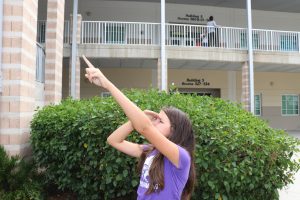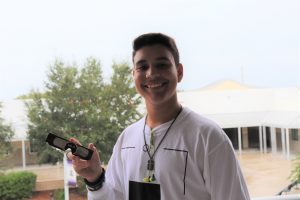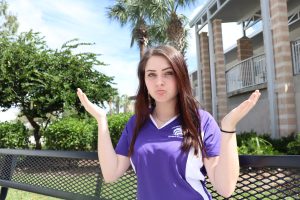August 21st, 2017, was an exciting day at Timber Creek High School. At 2:40pm, a total solar eclipse would pass through parts of the United States, and Florida would experience a partial solar eclipse. Many students had not seen a solar eclipse before, as the last solar eclipse was in 1979. A solar eclipse occurs when the moon’s path passes directly over the sun’s path, causing a period of total or partial darkness.
Since students would be able to look at the sun for an extended period of time, they were often reminded to avoid looking at the sun during the eclipse. In science classes, some students were taught about how a solar eclipse works and how scientists use history to predict future solar eclipses. Students spent time preparing for this amazing experience of a lifetime. Since the eclipse began around 1:15pm, some students left school early in order to view the eclipse with their families. Students were excited but also anxious about what the event would be like. They were coordinating with their friends and family where they would view the eclipse, and they went out and purchased glasses in order to view the eclipse safely.
While some students were excited for this once in a lifetime event, others did not know much about it before it occurred. As a result, many students did research or asked their teachers “why should we care about the eclipse?” The excitement around Timber Creek grew as the afternoon event grew closer, and this feeling united students. In the days following the eclipse, students posted pictures on social media about how and where they viewed the eclipse. Some students even traveled to South Carolina, Tennessee, and other places that experienced totality. Regardless of where students viewed the eclipse, the event was a unique experience for all students at Timber Creek.
Sophomore Morgan Fink enjoyed the solar eclipse in totality. “My family has a vacation home near Greenville, South Carolina, so we thought it would be fun to go up there and see this rare event.” Fink said she will definitely make an effort to view the next total solar eclipse in 2045.
Freshman Adrian Placido was able to watch the solar eclipse using his friend’s telescope. “I began watching it with glasses, but my friend’s dad brought out his telescope and it was much clearer” said Placido.
Senior Summer Christian was disappointed when she tried to look at the eclipse using glasses. “I put the glasses on, but when I looked up I couldn’t see anything” said Christian.


